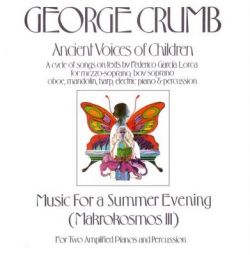 IGOR TORONYI-LALIC: I went to my local library to read through some of your scores. I couldn’t find any. I’d been looking in the wrong place. They were all too large for the ordinary shelves. They were all in the oversize section.
IGOR TORONYI-LALIC: I went to my local library to read through some of your scores. I couldn’t find any. I’d been looking in the wrong place. They were all too large for the ordinary shelves. They were all in the oversize section.
GEORGE CRUMB: [Laughs.] That’s familiar.
Your score, Ancient Voices of Children (1970), was the largest score they had. I feel it says something about your music.
Oversized scores used to be the big worry of my publisher but they’ve learnt to print them any size I delivered them. They are very accommodating. I don’t know why I got into oversize. I just like to see the music spread out in a particular way.
Was it necessary? Did you need the space for detail?
Yes. Some of those oversize scores had a page or more than one page that was involved with this circular notation and there wasn’t room on a normal page to include the design and all the detail that I needed. Like in Star-Child for orchestra the first page is a circle for all the string section and really quite a few notes in that large circle and it is repeated throughout the whole piece. The pages had to be large to accommodate the circular notation.
Have there ever been any scores that your publisher had problems publishing?
No. As I say, many years ago when I first broached the oversize scores they kind of blanched a little, they weren’t sure how they would ship these through the mail, for one thing, but then they discovered that mailing tubes are a very handy thing to have for this kind of score. Some of my scores aren’t so big but even my piano scores are what we call organ format, like a thin, vertically arranged score. I like the spread-out score. I think a lot of other composers have moved over to that choice of format.
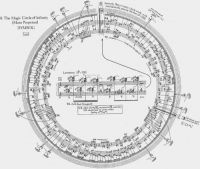 A lot of what you were doing with circular notation is medieval in origin. Did you look to them?
A lot of what you were doing with circular notation is medieval in origin. Did you look to them?
No, I really haven’t. I remember there were Renaissance or Medieval whimsical arrangements of the staves, horizontal and circular. But I haven’t really looked into earlier forms of this.
The reason why they’re so large often is because your palette is colour; it’s all in the instrumentation and technical directions. You need footnotes to delineate this.
That’s true. That’s another idiosyncrasy on my page.
Where did the idea that colour would become your basic compositional material?
Partly came from composers who influence my music a great deal. I knew Debussy’s music when I was quite young. I played the Préludes at the piano. My father had quite a large score collection. I could hear the Nocturnes and La Mer as works like that and I’d study the scores. I admired the fact that to me the timbre was equally important in Debussy to any of the other important elements like harmony or melody or rhythm. The timbre in a work like L’Après-midi d’un faune sounds as revolutionary as the Sacre du printemps by Stravinsky because every note has to be couched in the proper coloration. It’s a beautiful study in that world of new colours.
Your parents were musical. What did they do?
They were performers. My father was a clarinettist but like Charles Ives’s father he was a band conductor. He conducted a masonic band, taught clarinet and played in the local symphony orchestra, did a lot of chamber music. Also, in order to earn a living, he played whatever popular music styles that were in vogue at the time. Another thing he did, interestingly - he conducted a movie theatre orchestra for early silent movies. Sometimes they used a little orchestra rather than an organ or piano. He did that until sound came in, which broke off one wing of his income. My mother was a cellist.
Were they keen to listen to 20th-century music?
They were more classical-oriented. My father were interested in things like the American composers of the Thirties and Forties, and we got a lot of new music by the radio, so we heard the Shostakovich symphonies during the war years. We didn’t get a lot of European music until quite a few years after the war.
I feel Ives must have been an influence on your music.
I honestly didn’t get to know his music until I was in my early thirties. In the 1960s there just weren’t many recordings of this music. I knew him by reputation. Copland and others had written articles about him. But I just didn’t know the music and I don’t think a lot of people did.
What was the trigger for you to go into composition?
I was fascinated by following the scores my father had. I developed a love of music pretty early on. I studied clarinet with my father for a few years but then piano at the same time. That became a more practical tool in composition. That became my real instrument.
You were brought up in West Virginia until you were 21. There can’t have been much orchestral music live in concert?
Well, there was a community orchestra, as they called them in those days. It wasn’t the great shakes. It’s much better now. In those days both parents played in that orchestra. They played a range of things but it wasn’t as great a sound as the orchestras we heard on the radio. Still, with score in hand I’d attend rehearsals and so forth. I was always fascinated to hear the live sound. And in addition to that we had some of the music that Ives was so influenced by. I’d hear my father conduct band concerts. We had the West Virginia folk music - the early form of country music that settles in Nashville, Tennessee. We had jazz of the period on the radio. All these things were. I knew all the music of the church towns of the Bible Belt. I played in the local churches on a piano and a little organ.
Did you always know that you wanted to get into classical composition as opposed to any other type?
That was my main interest at this time. I wrote little pieces when I was 10 or 11 and they were of no consequence whatsoever, they were entirely juvenilia. I had this idea that Mozart was sort of contemporary music when I started and I used Mozart as a model.
What was the next model?
I worked my way thereon through history. I had to write my Beethoven. I wrote a trio in the style of Brahms. By the time I was in late high school we were already hearing modern things. I loved Bartók. He swept the country in the late 1940s. So I made the transition to more extreme central European music about that time and Bartók became a big influence on my music through my college years until finally I became aware that nobody could write the Bartók style as well as Bartók had already done it.
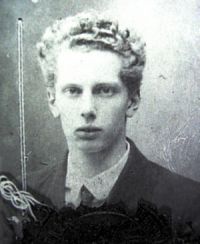 You chose to study with Boris Blacher (pictured as a young man, right) Why?
You chose to study with Boris Blacher (pictured as a young man, right) Why?
I had studied with Blacher at Tanglewood for eight weeks. Then when I got the Fulbright to go to Europe, I went to Berlin thinking I would have more lessons. By that time I was tired of studying composition. I had done this in graduate work and doctoral studies so when I was in Berlin I concentrated on piano. I used the first year first of all to listen to a lot of music at concerts and the opera but then to study the piano and to pull my technique up a little.
Did you ever think about become a professional pianist?
No. I never had that virtuoso edge. I had a little bit of facility but not the real virtuosity. I kind of hacked my way through a lot of the standard literature. I don’t think I was ever meant to be performing. I played a bit of contemporary music later when I was in Buffalo, New York. There was a special project there for composers and performers. I did a little playing but that quickly fell by the wayside. In fact most of my piano music I’d find too difficult for myself to play.
You play the percussion on a film called Bad Dog!
I do, but I’m not a percussionist. That was sort of a joke. David Starobin and the guitarist said, “George, why don’t you learnt the percussion part and I’ll fly us both to the French Riviera and we’ll premiere this in Cannes.” And he did. We both went and played there. But it’s not a very difficult percussion part. I’ve played percussion only on a couple of emergency situations, involving my own percussion parts. But I’m not a trained percussionist.
What were the emergency situations?
I think in a couple of cases where a player was sick, the concert couldn’t be postponed, I was asked to step in.
The extended techniques that you use are the secret language of performers. You really need to be a performer to understand what they are. So I’m surprised that you don’t intimately know the percussion as a performer. I presumed that you must to have known it well to get the colours you do out of it.
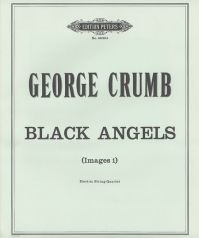 I’ve known a lot of percussionist and they’re always eager to show you new things that they’ve learnt, new instruments, new techniques, sometimes unusual ways of playing certain instruments. So I’ve learned a lot. I remember what they tell me. In the case of piano I can explore that on my own. As a matter of fact, when I was writing the Black Angels for String Quartet, I played rudimentary viola - I’m probably the worst viola player in the world – but it was enough. I could pick up the instrument and actually I think I invented a couple of things that show up in that piece.
I’ve known a lot of percussionist and they’re always eager to show you new things that they’ve learnt, new instruments, new techniques, sometimes unusual ways of playing certain instruments. So I’ve learned a lot. I remember what they tell me. In the case of piano I can explore that on my own. As a matter of fact, when I was writing the Black Angels for String Quartet, I played rudimentary viola - I’m probably the worst viola player in the world – but it was enough. I could pick up the instrument and actually I think I invented a couple of things that show up in that piece.
You developed all sorts of very strange new piano techniques. You must have been trying out all these things in college and at home and people must have thought you were mad?
I think my family thought I was nuts because they’d hear these sounds emanating from my little studio and they’d wonder what was going on. In the early days there was a lot of resistance on the part of piano tuners. They thought you were out to violate the instrument or destroy the instrument. That’s the last thing I’d ever want to do, to damage a valuable instrument. And in everything I do nothing where I'll hurt the piano. It might require the piano to be tuned a little sooner than normal. There was a lot of resistance. I would go to a university or some place for a concert and learn that I was given the third best piano and kept the other ones hidden from me. They had this idea that this was going to destroy the piano. It’s changed so much now, the feeling about this.
John Cage must have been doing his prepared pianos at about the same time.
It’s basically different from what I did. I knew the names Cage and Cowell, but again in the early 1960s when I started exploring the possibilities, I knew that things had been done to vary the piano sound but I had not heard any of the music so I was exploring this on my own. I like the sound of Cage’s prepared piano. The way he does that, that’s not something I’ve ever done. As interesting as the sound is, it locks the piano into that sound and it might not revert back to the normal piano after the performance. You spend an hour preparing the piano and those are the only sounds you’re going to get. Everything can immediately revert to the traditional piano sound so it’s a different concept.
How did you come across these ideas: using thimbles in various ways etc?
Some of the things were, I suppose, my own inventions. I had never heard of a composer bending the sounds with a chisel or a glass tumbler although [laughs] it is possible that a composer had used them before, I don’t know. I was constantly trying to find new ways for the acoustic sound of the piano. Messiaen was quite an influence at one time.
Why didn't you study with him rather than Blacher in Berlin?
I didn’t know about Messiaen at that time. This would have been in about 1955. I didn’t know his music until the 1960s. Americans generally weren’t so informed by his music for a few years yet, until the very late 1950s.
Were you ever interested in the Darmstadt School?
I was invited to teach there once. But I didn’t accept. I was not so tremendously involved. I kept up with some of the names, Stockhausen and Kagel and people like that who were associated with it, Boulez even for a while and Ligeti was connected with the group. Of those composers I suppose Ligeti is the one whose music interests me more. I sort of agree with Ligeti who said that that movement was a little misdirected. I think he himself felt that he was a little trapped in the aesthetic of that group.
Do you think it was too dogmatic?
I think it was a little bit pretentious in the technical aspects. The music should serve the inspiration rather than generate the whole aesthetic. For me there was too much abstraction and intellectuality involved with it.
Your harmonic language flits between tonality and atonality, and serialism is a language you engage in quite a lot.
Again it’s informed by my influences. Bartók loved the major triad and yet he wrote probably the most dissonant music. There are passages in the string quartet that, for grinding dissonance, go far beyond any of the Viennese composers like Schoenberg and Berg. And he loved tonality too. As did Debussy and Charles Ives. Their music goes back and forth. Debussy in the very late Etudes for the piano almost verges onatonality. So he has all sorts of modality and atonality, whole-tone modality, all these systems he uses and that’s what I love.
Having a toe-hold in tonality, was that necessary for you because of the feeling of resolution it intrinsically gives us humans?
Yes, tonality is pretty deep-rooted. But there have been beautiful 20th-century explorations of atonality. The repertory possibilities are very wide now. I take Bartók as an illustration of how a composer can use so many tonal centres and make them so stylistically compatible. Like Debussy too. Their style is seamless. It’s a miracle. Such a diversity of influences and sources and techniques and yet their music is seamless and completely authentic in terms of their own personality.
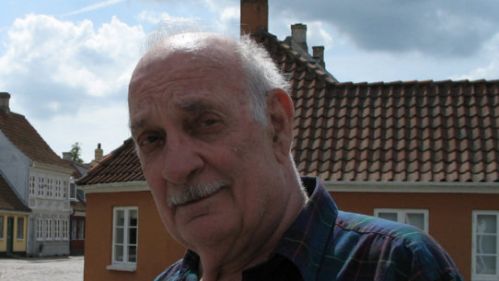
A group of composers who use timbre as a starting point to composition like you – and must have been influenced by you – are the Spectralists. They seemed to have problems finding a way to organise their music, however. Did you have problems finding ways to organise the new colours that you were conjuring up?
The formal aspect of the piece is the most difficult. It’s what I wrestle with constantly: to try to get the right form etc. I think I know exactly what you’re talking about. That’s difficult. The notes have to be the right notes and the rhythm has to be right and the form has to be right. It has to fulfil itself. It has to have a beginning and an end. Part of this is intuitive, I guess. But I rely a lot on classical and romantic models. I think so. I don’t think we ever forget the music we love. Maybe Brahms shows up some time or it may be late Beethoven. Or Bach. I love The Well-Tempered Klavier. I like to pull out Robert Schumann’s early piano works and play through them.
Do you go in for regulated sonata forms?
I wasn’t thinking in terms of forms in terms of specific structures, just as an overall concept. I would hesitate to try any kind of sonata form myself. I suppose one uses rondo-esque or variation principle. But the sonata structure is kind of locked into a different concept of tonality. It’s not functional. It deals with a structural tonality that we’re not quite into now. Although we admire that music.
Do you think your struggles with form lead you to using texts to anchor your music?
Yes. If you’re setting a text there’s an element of cohesion, a pre-existing element that you can hang the notes and music on.
The music of different cultures, various world musics, must have been an influence, judging from the number of very unusual percussion instruments that you use. How did you find out about them?
From knowing a lot of percussionists over my musical life. They show you things. New instruments. When I was a student in Ann Arbor, Michigan, my fellow students and myself were listening for fun to these recordings called Folkways records. You could hear music from Borneo or North Africa or South America or Tibet. We did that. None of our teachers talked about this music whatsoever. It’s something that we explored on our own. A lot of that stuff has stuck with me. All of that is a potential source for the composer nowadays.
You joined the faculty of Pennsylvania University in 1965.
I taught at the University of Colorado before that. I taught at Pennsylvania for over 35 years.
One line of thought among modern composers was that music should retreat into the universities because music was a science and not necessarily, in its modern incarnation, for entertainment. The composer and theorist Milton Babbitt famously pronounced this in his essay, “Who Cares if You Listen?”
I know what you mean. It’s not a feeling I shared ever. I like Milton Babbitt personally as a human being but this sort of idea seems nonsense to me. I never understood what this meant. It’s pretentious. It’s more of that Darmstadt stuff - composers thinking that they have to be equal to physicists or chemists. It’s a marriage of convenience altogether that composers have found themselves in universities as far as I’m concerned. I enjoyed the teaching but it was entirely a matter of convenience. It was a way of earning your daily bread.
Your works have received more attention than many avant-garde works because they’ve never been stridently uncompromising. Is it an accident that your works are so accessible?
I don’t know what uncompromising means. Because a lot of music that pretends to be uncompromising is really avoiding the central plank of trying to communicate to another human being. Music is more than an intellectual game or a way of playing with arithmetic. I’ve never understood the refusal to accept that there can‘t be such a thing a spirituality in music. I don’t think Messiaen would have talked in terms of this mathematical game. He knows how to hit your solar plexus and he knows how to make his effects.
Are you spiritual in a religious sense?
No, I was using that in a very broad sense. As opposed to the physicality of music, the spirituality is there. When I was a kid in the South I experienced all the normal things that those in the Bible Belt in the US experienced. But by the time I was in high school I recognised for myself that no one had a monopoly on truth.
A lot of your works deal with pretty big concepts, with the idea of eternity, the cosmos and a future or past atavism. They’re full of opposing forces, light and shade. Are you not drawn to religion at all?
Sometimes I think Hinduism is perhaps the most beautiful religion in the world because it deals in terms of millions and millions of years and recognises all life forms as coequals. A lot of my music is inspired by reading of the new astronomy, concepts in science. I guess it’s nothing new at all. Mine is a metaphysical kind of music that you hear in Bach or in late Beethoven.
John Adams used to say that working in America was like working in a vacuum. Do you think that’s the case?
The last 10 or 20s I’ve never seen so many genres. Radios are filled with all this music. By far the largest share of radio music is given over to them. But even here these are sources too. I have been involved in doing traditional American songs and a number of songbooks, so I’ve done my own little crossover thing, I guess. I wrote something on Thelonius Monk’s song.
Do you enjoy that?
Oh, I enjoyed that. People say that that maybe is my best piano piece. In the song books I’ve used blues elements and things like that. It may be that the amplification one associates from rock music I’ve borrowed and played in a concert environment.
Might we in the future hear a George Crumb hit in the charts?
I don’t know about that. I wouldn’t predict that. Music is coming together in a crazy way.
How do you compose. Do you get up early every day? Is it a chore?
I try to work each day. Writing is a very slow process. I have to do a lot of sketching. Making false starts. I sometimes think that composing is a bit like groping, feeling your way, you’re not sure what you’re after always. It’s never easy. It doesn’t get easier as I get older. It gets ever more difficult.
Are you running out of ideas? Do you think that’s the problem?
The problem for me is finding the right form and thematics that have some authentic quality and some character and so forth. I still think in thematic terms, despite all the experiments by people like Ligeti into textures etc. They’re very interesting experiments, but I revert back to thematics.
Visit George Crumb's website here. Bad Dog! is screened at the Barbican on 5 December as part the BBC's day-long celebration of Crumb's life and work. For further information visit bbc.co.uk/totalimmersion.














Add comment